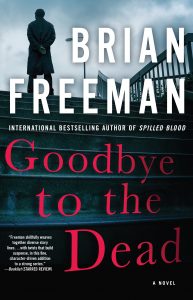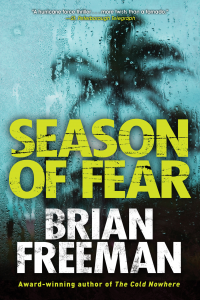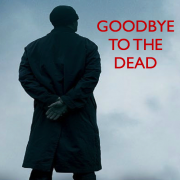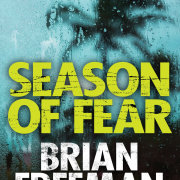What Makes a Great Thriller?
Are you looking for a great thriller? (Well, after you read GOODBYE TO THE DEAD, of course.)
Check out my post at bookish.com, where I talk about the 10 essential qualities of a great mystery or thriller — and highlight 10 novels that get it just right. A sense of place? A spectacular twist? A gripping first chapter? These are just some of the important elements that readers expect — and that the best writers always deliver.
The Huffington Post
Go behind the scenes on GOODBYE TO THE DEAD and 10 years of my Jonathan Stride thrillers in this great interview from The Huffington Post.
Columnist-author Mark Rubinstein delves into the inspirations behind the book, the series, and my writing career. If you want to know how I approach my thrillers, this is a terrific place to start.
Do you have your copy yet of GOODBYE TO THE DEAD? Fresh Fiction says: “Master storyteller Brian Freeman knocks it out of the park with his latest Jonathan Stride crime thriller…hugely addictive with each unexpected twist and turn in the investigation….This compelling police crime thriller should be on everyone’s must-read list.”
Available Now
The wait is over! Jonathan Stride is back…and GOODBYE TO THE DEAD is available right now.
I think this is one of those books you will want to add to your permanent collection. It’s a story that brings the past and present of Stride’s life together once and for all. I hope you enjoy it — and that you’ll help me spread the word to your reader friends.
 Here’s what Fresh Fiction had to say about the new book in their review:
Here’s what Fresh Fiction had to say about the new book in their review:
“Master storyteller Brian Freeman knocks it out of the park with his latest Jonathan Stride crime thriller…hugely addictive with each unexpected twist and turn in the investigation….This compelling police crime thriller should be on everyone’s must-read list.”
I’ve got book tour events coming up in Minnesota, Wisconsin, Nebraska, Colorado, Arizona, Texas, and North Carolina. If I’ll be in your area, please stop by my event and pick up a signed copy! I’d love to meet you.
Happy reading!
Ten Years: A Pioneer Press Retrospective
CLICK HERE TO READ THE PIONEER PRESS ARTICLE.
With the release of my latest Jonathan Stride thriller GOODBYE TO THE DEAD just days away, Mary Ann Grossman of the Pioneer Press has written a wonderful retrospective on my ten years in the book business. It’s a great way to get to know me and my novels.
Sometimes it’s hard for me to believe that I’ve spent a decade writing and publishing thrillers around the world — about a third of my working life. As someone who dreamed of writing books from a young age (I was working on a mystery novel in sixth grade!), this really has been the achievement of a life-long goal. The publishing business is one of the toughest ways to make a living, but it also offers rewards that you can’t get anywhere else.
More than anything, as you’ll see in Mary Ann’s article, I’ve been fortunate to run this business as a partnership with my wife, Marcia. (She gets the first two words in every book!) We do this all together — editing, marketing, hitting the road, doing events — and that’s the best part of this new life we created ten years ago.
I hope you enjoy getting to know us in this article — and I hope you buy a copy of GOODBYE TO THE DEAD and fall in love with it. It’s one of my own personal favorites among my novels.
Booklist on West 57
Have you read my latest book, WEST 57…?
This book is totally different from my dark, intense thrillers — but regardless of what genre you read, I think you’ll enjoy WEST 57. Booklist — the publication of the American Library Association — just chimed in with their review:
 “Freeman, better known as thriller writer Brian Freeman, takes a second turn at chick lit (after penning 2009’s THE AGENCY as Ally O’Brien), with just the right mix of zany humor, sexy romance, and cheeky jabs at the publishing world. There’s even a fair bit of intrigue, as everyone races to find out the real story behind the best-selling book (it’s a doozy!). Fans of classic single-in-the-city chick lit will find much to enjoy here.”
“Freeman, better known as thriller writer Brian Freeman, takes a second turn at chick lit (after penning 2009’s THE AGENCY as Ally O’Brien), with just the right mix of zany humor, sexy romance, and cheeky jabs at the publishing world. There’s even a fair bit of intrigue, as everyone races to find out the real story behind the best-selling book (it’s a doozy!). Fans of classic single-in-the-city chick lit will find much to enjoy here.”
You can get the book now in paperback or e-book at a great price. Don’t miss it! And if you usually get your books at the library, be sure to ask them to order you a copy.
Stride and Cab
Readers first met Cab Bolton in my sixth novel THE BONE HOUSE — which was also my first novel not to feature Duluth police lieutenant Jonathan Stride. I originally envisioned THE BONE HOUSE as a stand-alone, but readers soon demanded to see more of this quirky Florida detective.
Well, after the pure stand-alone SPILLED BLOOD (which won the 2013 Thriller Award for Best Hardcover Novel) and the new Stride novel THE COLD NOWHERE, Cab Bolton is finally back in my all-new thriller SEASON OF FEAR.
So how does Cab Bolton differ from the intense, introspective Jonathan Stride?
 “Sarcasm doesn’t suit you,” Cab Bolton’s mother tells him.
“Sarcasm doesn’t suit you,” Cab Bolton’s mother tells him.
“And yet I stick with it,” he replies.
Cab isn’t your typical cop. For one thing, he doesn’t look much like a cop. Imagine a young Peter O’Toole…absolutely amazing blue eyes, spiky blonde hair, skin so perfect you want to know what moisturizer he uses. He’s crazy-tall and wouldn’t be caught dead in anything but an expensive suit. He’s got money, thanks to his Hollywood mother, so he’s a cop not because he HAS to be but because he WANTS to be. He enjoys the game. The challenge. He’s clever, and he’s good at it.
However, Cab may as well wear a sign that says: Does not play well with others. He hates authority. He doesn’t like rules. He’s still figuring out what he wants to do with his life. And for most of his 35 years, he’s been playing a game of hopscotch, jumping from place to place. Other cops call him Catch-a-Cab Bolton, because he always has one foot out of town.
He loves women (okay, he has that in common with Stride), but he doesn’t trust them. He’s been betrayed by women before, and he grew up with a mother who didn’t know the meaning of commitment herself. So his relationship with his girlfriend Lala is on-again, off-again. There are fireworks in bed and fireworks when they argue. Don’t make bets on a long-term affair for them.His other relationship — with his actress mother Tarla — is just as problematic. He lived on the other side of the world from her for years, but now she’s back in his life and trying to control it. Tarla made Cab who he is, and he’s not entirely sure he likes that. She also keeps secrets from him — like not telling him who his father was or why he has the odd name Cab. So when people ask, he just makes up stories.
One thing about Cab…he’s genuinely charming. Handsome. Funny. Sharp. He banters with friends and enemies alike. He’s secure about who he is and who he’s not. He takes life seriously — but he doesn’t take himself seriously. Which makes him impossible not to like.SEASON OF FEAR also takes me to a new setting in hot, humid central Florida. Most of my earlier books (except the Vegas-based STRIPPED) have taken place in the American Midwest, with its dirt roads, bitter winters, and dark forests. I love the drama of those settings, and I like to give readers a “you are there” feel, where they are dropped into the middle of every scene and can taste, touch, feel, and smell it happening all around them.
However, Florida weather is typically so darn nice that writers just seem to have fun with it. Many of the great Florida writers are satirists (think Hiaasen) who deliciously profile the offbeat, Jimmy Buffett-meets-Lindsay Lohan attitude of Miami and the Keys. Me, I wanted to see if I could export my love of dark settings to a place called the Sunshine State. Needless to say, some really bad weather is headed for the coast.
Cab is a Florida detective, but will he stay that way? Don’t count on it. You can’t separate Jonathan Stride from his hometown of Duluth, but Cab doesn’t have the same roots. He doesn’t have a hometown at all, and chances are, he’ll show up in other settings going forward.
Some readers are already asking: Will Jonathan Stride ever meet Cab Bolton? Will they — like Harry Bosch and Mickey Haller — turn out to have some secret family connection that bridges my two series?
No, I don’t think so.
Cab and Stride are opposites of each other in many ways. Stride is the emotional hero — driven by his relationships, passionate (sometimes too passionate) about the victims he’s trying to help. Cab isn’t comfortable with emotions. He doesn’t like to go there, because usually, he doesn’t like what he sees. And if Stride always seems tangled in a web of women, Cab is a loner at heart. I think Cab and Stride would be oil and water if I put them together in a book.
Then again, I’ve learned to never say never.





